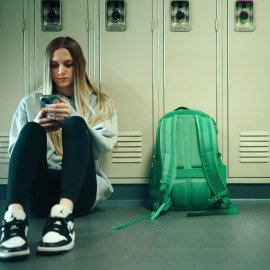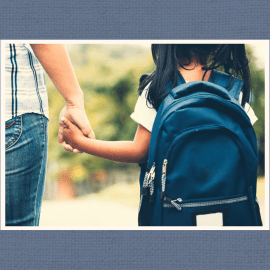I was a talentless, completely unstealthy 14-year-old, eager for some “teenage adventure.” It was freshman year of high school, and I had just snuck out for the first time, when I felt finally, totally grown. But like the novice that I was, I came trudging back through my apartment door in a clumsy manner. I left the spare keys lying out on the table and my shoes a mess. I went to bed totally assured that I had pulled off the greatest feat of deceit ever known, and I would never be caught.
This was not the case. When I opened my eyes the following morning, it was not because of an alarm, but because of my mom dangling the misplaced spare keys in front of my face.
Their resolution and “solution” from there on out was to track me using the popular app Life360. I am their only child, and not only is it their first time parenting in the digital age, but also their first time parenting in general. There is no older sibling to guide their choices for me.
I was devastated at the time. My newly gained freedom had been snatched out from under me; I was being controlled under the hand of a suppressive regime. Back then, my parents had claimed that they tracked me for the sole purpose of making sure I was safe, but I didn’t totally buy it — and even if I did, I still wasn’t too thrilled about it. I assumed that safety went both ways, but they refused to give me their locations too. To me, it felt like a mechanism for control: a way for them to lurk in the shadows ready to crush my every unwise 14-year-old ambition. So, I had the natural reaction of any teen: I became sneaky, and I figured out the ways around Life360.
Now at 17, they still have access to my location, and I don’t mind it nearly as much. We have good communication, and they (mostly!) always know where I am. But in the three years it took to get to this point, my friends and I got clever, and it took no more than a quick TikTok search.
Sneaky Option #1:
I was at my friend’s house when I was 15, both of us victims of the Life360 epidemic, when we caught wind of a party we simply HAD to attend. That party was the place to be; everyone who was anyone was going to be there, and we knew what was awaiting us if we did (or didn’t) go. It was either social downfall or a months-long house arrest, so my friend and I were faced with the question of how to avoid surveillance when we were to be in bed strictly by 11. A TikTok video of a guy whose credentials were “former teenager” promised to have all the answers.
First, he instructed us to go to our settings and toggle on and off a few of the options under Life360. Then we were instructed to turn off WiFi and bluetooth so that our last known location would be saved as my friend’s house. We left the house and put it to the test. It seemed to work at first; our last location was saved and it didn’t show us moving, and neither of us had heard from our overbearing mothers: It seemed like a master plan. But something must have gone wrong — perhaps we connected to the party’s WiFi — so we were sentenced and put back in our pens. (I believe that Life360 has since fixed this clever hack, for any hopeful teen readers.)
Sneaky Option #2:
This seems like the more obvious, but slightly riskier move: Leave the phone in question at home. At 16, two of my friends had the novel idea to take an Uber up to our other friend’s house in Connecticut at the ripe hour of 1 a.m. Of course, there was the question of how to pull this off sight unseen. The solution was leaving their phones in a pile under the bed (below the fake bodies constructed out of pillows). They took their computers instead, planning to connect them to WiFi in order to communicate with each other and eventually call the Uber home.
Against all odds, this one was pulled off. Some might say this was poor judgement and a little dangerous, but hey, if we weren’t tracked, my friends could’ve just brought their phones. I, too, tried this method once or twice, but never on a trip across state lines.
To be sure, tracking and safety can go hand-in-hand. But our parents were never tracked, and I know their parents weren’t either. And miraculously (as they might suggest), they are still alive to tell about it. What it must have been like to grow up in the good fortune of pre-technological times! The world used to be an open field of possibility for us teens; now it seems it’s more of a high tech police state run by our parents.
Perhaps the absence of tracking gave our parents a better sense of independence and autonomy. It certainly gave them fewer opportunities to lie to their parents. I think the term “safety” might be a larger umbrella of an excuse to control us; after all, we are their precious offspring, their legacy for the future world. But ironically, tracking in the name of safety often leads to more friction in parent-child relationships, and less opportunity to have experiences critical to growing up. Parents were never meant to know everything that goes on in the lives of their teens — it’s simply unnatural.
Mom and Dad, if you’re reading this, sorry! Forgive me! And I’d like your locations too … just to make sure everyone’s safe.







